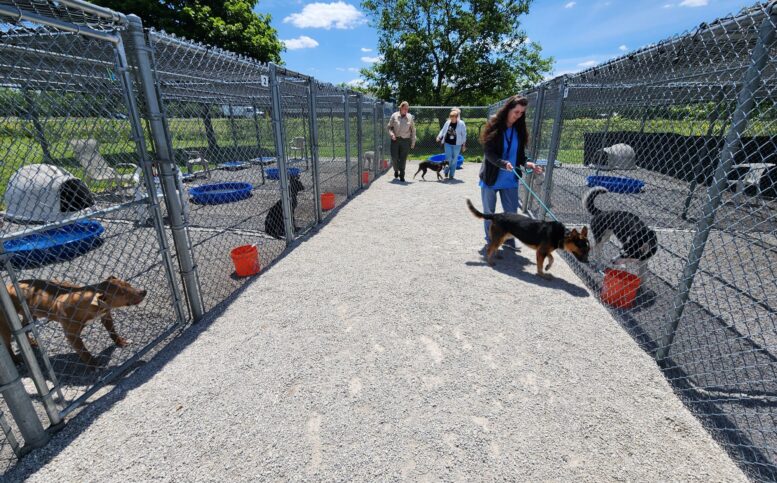By JAN McLAUGHLIN
BG Independent News
Wood County Chief Dog Warden Jodi Harding did not expect the annual dog license checks to unleash so many conspiracy theories and concerns about officials stepping on private property.
Nor did she expect suggestions that the dog shelter staff look into cat problems, and check on meth labs while they are at it.
At least one dog warden has had a door slammed in his face, and Harding took a phone call from one resident who said his dogs identify as chickens.
So Harding, the chief dog warden, corrected a few misconceptions on Tuesday.
First, dog licenses have been required for more than a century in Ohio for all dogs older than 3 months. This is not a new scam to “grow government,” or provide luxurious lodging for the stray dogs who end up at the shelter. The $14 licenses are the only funding available for shelter operations – no tax money goes to the facility.
Second, the door-to-door checks are conducted every year. No, the dog wardens don’t knock on every door in the county. When the new year rolls around, the Wood County Auditor’s Office, which handles dog licensing, gives the warden a list of county residents who had dogs licensed the previous year. If those people didn’t renew their dog licenses this year, the warden’s staff makes phone calls in February and March to remind them to do so if they still have dogs.
Those people who don’t respond make the list of places for dog wardens to knock on the door.
“We print out a new list the morning we go out,” so the wardens don’t bother people who have recently purchased licenses, Harding said.
Next, the dog wardens do not go into homes, backyards or garages. They knock on front doors, and ask the residents if they have dogs.
“All we’re doing is knocking on the door. We’re not entering the property,” Harding said.
The wardens don’t look for dog hair or drool on the person at the door. They just advise the residents to go online and purchase a license online from the county auditor’s website if they still own dogs. If no one answers the door, the shelter staff leaves a notice to contact their office.
Any licenses purchased after the Jan. 31 deadline double in price to $28. People found to have unlicensed dogs can receive a court citation.
In response to people whose pets have passed, who objected to the “heartless” phone call or home visit, Harding apologized. But how are they to know?
“We don’t want to offend anybody. The last thing we want to do is make somebody upset about losing a dog,” said Harding, who has a soft spot for all canines. “We’ve all been there.”
The shelter staff started knocking on doors in the southern portion of the county earlier this month, and are working their way northward.
“For the most part, people are pretty pleasant,” Harding said of those people who open their doors.
Harding heard from one dog owner, who did not believe he should be required to buy a license since his dogs never get loose. But the dog warden’s staff does more than return lost dogs to owners. They also catch other stray dogs running through neighborhoods.
There are currently about 14,000 dogs in the county with one-year licenses, another 1,200 with three-year licenses, and about 230 with permanent licenses. That leaves 1,531 unrenewed licenses from last year.
“That’s what funds the shelter,” Harding said. “A lot of people think we get tax money – that’s not so.” Intakes are up at the dog shelter, which means the expenses are up for items such as food, bedding, and medical care.





